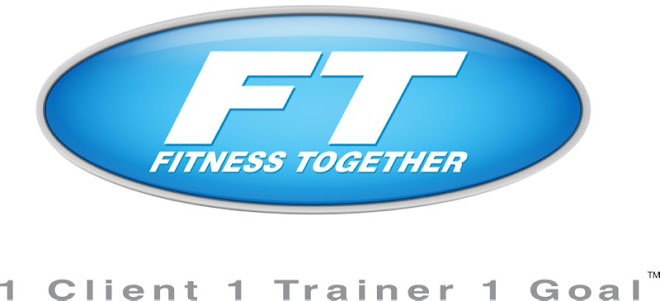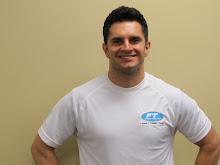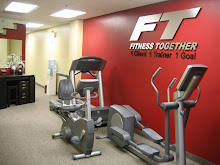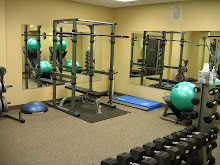Serotonin, a chemical present in your brain, has a huge affect on your overall daily health. What is serotonin you ask? Well, serotonin acts as a neurotransmitter, a type of chemical that helps relay signals from one area of the brain to another. Although serotonin is manufactured in the brain, where it performs its primary functions, some 90% of our serotonin supply is found in the digestive tract and in blood platelets. To learn about eight other ways this important chemical affects our health both phusically and emotionally visit this page at WebMd.com.
Fitness Together Lake Forest
1 Client. 1 Trainer. 1 Goal.
1 Client. 1 Trainer. 1 Goal.
Wednesday, January 27, 2010
Tuesday, January 12, 2010
Ask the Dietician...

Q: I am trying to be mindful of the sodium listed on food labels. How much is too much?
A: One quick tip is to look at the “% DV” (percent of Daily Value) listed for sodium. Total daily sodium consumption should be less than the DV of 2,400 milligrams (mg). If a food supplies 20 percent of sodium’s DV (480 mg), it is considered high in sodium. If the product is a whole meal or a prepared main dish, more than 600 mg per serving is considered high.
If you eat out a lot or tend to eat high-sodium snack foods or processed foods, you should practice extra caution with your other food choices. Aim to fill the majority of your diet with naturally low-sodium vegetables, fruits and unprocessed grains. Also note that the nutrient content percentages on food labels apply to the designated serving size. If you eat a larger portion than what is listed, you can quickly increase your sodium intake. Finally, since the “% DV” refers to the limit of 2,400 mg of sodium, it’s not an accurate gauge of the 1,500 mg limit that is recommended for those who are salt-sensitive (people with high blood pressure and many African-American, middle-aged and older adults). If this includes you, you can still use the “% DV” figure to scan for higher and lower sodium foods, but realize that you are aiming to keep your daily total at roughly 60 percent of DV.
A: One quick tip is to look at the “% DV” (percent of Daily Value) listed for sodium. Total daily sodium consumption should be less than the DV of 2,400 milligrams (mg). If a food supplies 20 percent of sodium’s DV (480 mg), it is considered high in sodium. If the product is a whole meal or a prepared main dish, more than 600 mg per serving is considered high.
If you eat out a lot or tend to eat high-sodium snack foods or processed foods, you should practice extra caution with your other food choices. Aim to fill the majority of your diet with naturally low-sodium vegetables, fruits and unprocessed grains. Also note that the nutrient content percentages on food labels apply to the designated serving size. If you eat a larger portion than what is listed, you can quickly increase your sodium intake. Finally, since the “% DV” refers to the limit of 2,400 mg of sodium, it’s not an accurate gauge of the 1,500 mg limit that is recommended for those who are salt-sensitive (people with high blood pressure and many African-American, middle-aged and older adults). If this includes you, you can still use the “% DV” figure to scan for higher and lower sodium foods, but realize that you are aiming to keep your daily total at roughly 60 percent of DV.
Karen Collins is a registered dietician for 'Health and Fitness Sports Magazine' 2009.
Edited by Fitness Together Lake Forest Staff
Tuesday, January 5, 2010
4:1 Ratio is Golden!
Most athletes know of the importance of eating before exercise, however, what and when you eat after exercise can be just as important. While the pre-exercise meal can ensure that adequate glycogen stores are available for optimal performance (glycogen is the the source of energy most often used for exercise), the post-exercise meal is critical to recovery and improves your ability to train consistently. Want to learn more?!?
Follow this to an article on what to eat after exercise to replenish your very important muscle glycogen stores.
Labels:
4:1,
carbs,
post workout,
protein
Tuesday, December 29, 2009
Charting Your Course!
2010 is almost here!!! Have you laid out your goals for the year yet?? Naturally, this is when most will decide to make fitness a top priority. If you are one of the millions out there considering to embark on the fitness journey, I would like to give you a few things to consider before you start.
1. Fitness maybe the top priority, but you will not maximize successful unless you address the other facets of life (business, personal, spiritual, etc). Do your best and make sure the other areas aren't underwhelming or overwhelming your chances of becoming more fit. Just be realistic and "consider the entire picture". Lets face it...! Unlike the contestants on the Biggest Loser, our lives are not lived out in a "box". We have many variables that we have to consider. All I'm suggesting is that you consider ALL variables to ensure that you can set realistic goals for yourself. Once this is complete, you will be able to move forward with purpose and confidence.
2. The Cold Hard Truth: For those of you that are just starting the fitness journey, only a small % will be successful and follow through throughout the year (and beyond). (Trust me, I don't want to be the bearer of bad news however, you need to know what your up against.) Most will not make it past Valentines Day!!! Here are a few explanations (pitfalls):
a. Unrealistic goals are set
b. Injury stemming from working out too hard, too soon.
c. Overwhelmed
d. Plain laziness (again, speaking the truth here)
e. The "other variables" (read the first paragraph)
The good news here is that there doesn't have to be any pitfalls. Quite frankly, there is no reason why you can't do this (fitness success)!!!! Look yourself in the mirror and ask if "what potential pitfalls stand in my way?" From here, all you will need to do is to address each one accordingly. I was training a client lastnight and right in the middle of an exercise he stopped and said, "most of this is psychological isn't it?". This is correct!! In most cases it's our "head trash" that get in way, not our circumstances. So, look to identify YOUR potential road blocks and come up with solutions to get around them. You are probably already doing this in other areas, so just apply it to fitness.
I guess my message here has little to do with fitness and more to do with one's perspective as they start a fitness program. Fitness is not rocket science because if it was I probably wouldn't be a personal trainer :-).
It's all about aligning ourselves with the things in life that will get us to where we want to be. We all have a path and your path will be different or very similar to someone else's. Identify YOUR path to sucess and go at it step by step.
Fitness has never failed anyone, but people have failed fitness!!
Look ahead and chart your course. Its going to be a great journey!!
Rob Johnson
Owner, Trainer of Fitness Together Central Cal located in Fresno, California.
1. Fitness maybe the top priority, but you will not maximize successful unless you address the other facets of life (business, personal, spiritual, etc). Do your best and make sure the other areas aren't underwhelming or overwhelming your chances of becoming more fit. Just be realistic and "consider the entire picture". Lets face it...! Unlike the contestants on the Biggest Loser, our lives are not lived out in a "box". We have many variables that we have to consider. All I'm suggesting is that you consider ALL variables to ensure that you can set realistic goals for yourself. Once this is complete, you will be able to move forward with purpose and confidence.
2. The Cold Hard Truth: For those of you that are just starting the fitness journey, only a small % will be successful and follow through throughout the year (and beyond). (Trust me, I don't want to be the bearer of bad news however, you need to know what your up against.) Most will not make it past Valentines Day!!! Here are a few explanations (pitfalls):
a. Unrealistic goals are set
b. Injury stemming from working out too hard, too soon.
c. Overwhelmed
d. Plain laziness (again, speaking the truth here)
e. The "other variables" (read the first paragraph)
The good news here is that there doesn't have to be any pitfalls. Quite frankly, there is no reason why you can't do this (fitness success)!!!! Look yourself in the mirror and ask if "what potential pitfalls stand in my way?" From here, all you will need to do is to address each one accordingly. I was training a client lastnight and right in the middle of an exercise he stopped and said, "most of this is psychological isn't it?". This is correct!! In most cases it's our "head trash" that get in way, not our circumstances. So, look to identify YOUR potential road blocks and come up with solutions to get around them. You are probably already doing this in other areas, so just apply it to fitness.
I guess my message here has little to do with fitness and more to do with one's perspective as they start a fitness program. Fitness is not rocket science because if it was I probably wouldn't be a personal trainer :-).
It's all about aligning ourselves with the things in life that will get us to where we want to be. We all have a path and your path will be different or very similar to someone else's. Identify YOUR path to sucess and go at it step by step.
Fitness has never failed anyone, but people have failed fitness!!
Look ahead and chart your course. Its going to be a great journey!!
Rob Johnson
Owner, Trainer of Fitness Together Central Cal located in Fresno, California.
Thursday, December 24, 2009
3 Reasons Crash Diets Don't Work
Follow this link and see evidence why crash dieting for any occasion, especially when it comes to your health, don't work.
By Tina Haupert of Health.com
Edited by Jason Copeland, CSCS
Subscribe to:
Posts (Atom)












